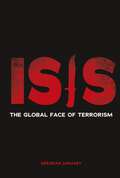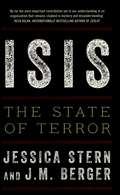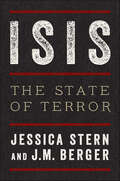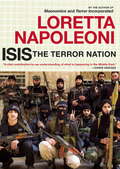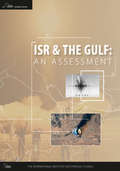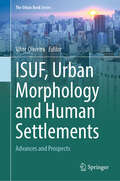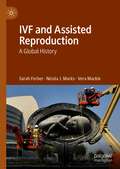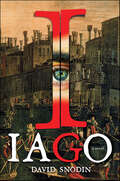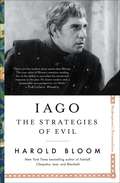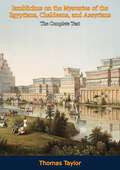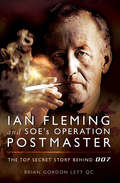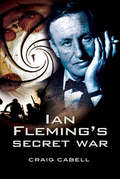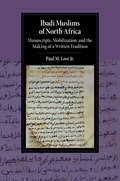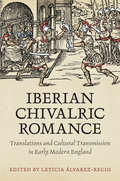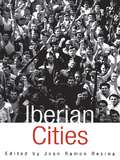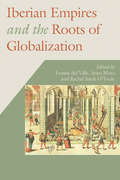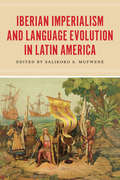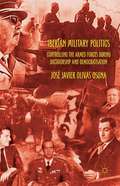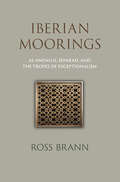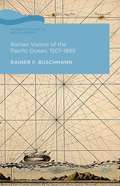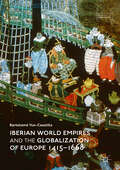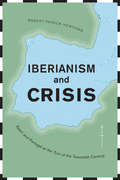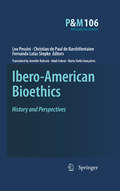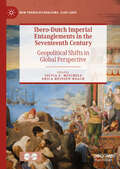- Table View
- List View
ISIS: The Global Face of Terrorism
by Brendan JanuaryThe Islamic State in Iraq and Syria, or ISIS, emerged in the Middle East during the first decade of the 2000s. The group vows to wage violent jihad, or holy war, on those who do not adhere to its extremist interpretation of Islamic law. ISIS conquers territory and rules savagely. ISIS terrorists manipulate social media brilliantly, shocking viewers around the globe with brutal video footage. Government leaders and agencies all over the world are working to prevent the next ISIS attack. How can nations combat ISIS? Can it be defeated with military force? This in-depth investigation tackles these and other thorny issues related to the twenty-first-century face of global terrorism.
ISIS: The State of Terror
by Jessica Stern J. M. BergerThe authors outline the origins of ISIS as the formidable terrorist group it has quickly become and attempts to answer the question of what our next move - as a country, as a government, as the world - should be.
ISIS: The State of Terror
by Jessica Stern J. M. BergerThe Islamic State, known as ISIS, exploded into the public eye in 2014 with startling speed and shocking brutality. It has captured the imagination of the global jihadist movement, attracting recruits in unprecedented numbers and wreaking bloody destruction with a sadistic glee that has alienated even the hardcore terrorists of its parent organization, al Qaeda.Jessica Stern and J.M. Berger, two of America’s leading experts on terrorism, dissect the new model for violent extremism that ISIS has leveraged into an empire of death in Iraq and Syria, and an international network that is rapidly expanding in the Middle East, North Africa and around the world.ISIS: The State of Terror traces the ideological innovations that the group deploys to recruit unprecedented numbers of Westerners, the composition of its infamous snuff videos, and the technological tools it exploits on social media to broadcast its atrocities, and its recruiting pitch to the world, including its success at attracting thousands of Western adherents. The authors examine ISIS’s predatory abuse of women and children and its use of horror to manipulate world leaders and its own adherents as it builds its twisted society. The authors offer a much-needed perspective on how world leaders should prioritize and respond to ISIS’s deliberate and insidious provocations.
ISIS: The Terror Nation
by Loretta NapoleoniFrom its birth in the late 1990s as the jihadist dream of terrorist leader Abu Musab al Zarqawi, the Islamic State (known by a variety of names, including ISIS, ISIL, and al Qaeda in Iraq) has grown into a massive enterprise, redrawing national borders across the Middle East and subjecting an area larger than the United Kingdom to its own vicious brand of Sharia law.In ISIS: The Terror Nation, world-renowned terrorism expert Loretta Napoleoni builds on her international best-selling The Islamic Phoenix, with new chapters on the Islamic State's recruitment of Western women, economic strategy, and recent terrorist attacks around the world. Napoleoni takes us beyond the headlines, demonstrating that while Western media portrays the Islamic State as little more than a gang of thugs on a winning streak, the organization is proposing a new model for nation building. Waging a traditional war of conquest to carve out the twenty-first-century version of the original Caliphate, ISIS uses modern technology to recruit and fundraise while engaging the local population in the day-to-day running of the new state. Rising from the ashes of failing jihadist enterprises, the Islamic State has shown a deep understanding of Middle Eastern politics, fully exploiting proxy war and shell-state tactics. This is not another terrorist network but a formidable enemy in tune with the new modernity of the current world disorder. As Napoleoni writes, "Ignoring these facts is more than misleading and superficial, it is dangerous. 'Know your enemy' remains the most important adage in the fight against terrorism."
ISR and the Gulf: An Assessment
by The International Institute for Strategic StudiesIntelligence, surveillance and reconnaissance (ISR) is today a core capability for the modern military, in peacetime and in war. ISR is and will remain a key enabler in the Gulf region in ongoing conflicts. There is still a reliance on the United States, and its ISR systems deployed in the Gulf, to facilitate ongoing operations and to provide situational awareness at the tactical, operational and strategic levels. However, even US ISR is finite, and there is growing demand for its resources in other regions. The Gulf Cooperation Council states have some ISR capacity, but this needs further development and improved exploitation to better address regional needs. Written by a team of IISS specialists, ISR & the Gulf: An Assessment considers the meaning of and requirement for intelligence, surveillance and reconnaissance in the context of the region. It examines the military needs and industrial aspirations of the Gulf Arab states regarding ISR, and the opportunities and risks these present. The report is a companion work to the Institute’s Missile-Defence Cooperation in the Gulf, and is similarly intended to help provide the basis for informed decision-making to support improved security in the region.
ISUF, Urban Morphology and Human Settlements: Advances and Prospects (The Urban Book Series)
by Vítor OliveiraThis book offers insight into the most important scientific society on urban morphology worldwide: the International Seminar on Urban Form (ISUF). After addressing the three-decade history of ISUF, the book analyses the present and future of this scientific society, of urban morphology, and of human settlements. This timely and fundamental reflection gathers contributions from present and past leadership of ISUF since its inception in 1994. Over the last three decades, the urban world has undergone major changes: the urban population is now higher than the rural population; more than half of the world's population lives on a single continent—Asia, home to almost three billion people in China and India alone—so geographical imbalance is considerable; and while half of the urban population still lives in small cities of fewer than 300,000 inhabitants, the number of megacities has increased significantly. How does the physical form of cities in different parts of the world respond to these dynamics? Can cities preserve fundamental elements of humankind's urban heritage while accommodating changes driven by the main socioeconomic and environmental needs of today? The field of urban morphology has been continuously adjusting to the essential dynamics of its object of study. While developing and strengthening its most robust theories, concepts, and methods designed after the mid-twentieth century, urban morphology has been able to integrate innovative approaches for describing and explaining the emerging dynamics and patterns of urban form—often incorporating groundbreaking technologies for data collection, analysis, modelling, and simulation. But what is the role of urban morphology in science and society today? How effective is it in communicating a rigorous understanding of the urban landscape both to academics and researchers in other fields and to citizens in general? How successful is it in providing practitioners with relevant and useful knowledge that informs their action on cities' form and structure through spatial planning, urban design, and architecture? This book addresses these fundamental questions, offering academics, researchers, and practitioners comprehensive knowledge on human settlements, the field of urban morphology, and the role of ISUF in promoting groundbreaking morphological thought.
IVF and Assisted Reproduction: A Global History
by Vera Mackie Sarah Ferber Nicola J. MarksThis is the first transnational history of IVF and assisted reproduction. It is a key text for scholars and students in social science, history, science and technology studies (STS), cultural studies, and gender and sexuality studies, and a resource for journalists, policymakers, and anyone interested in assisted reproduction. IVF was seen as revolutionary in 1978 when the first two IVF babies were born, in the UK and India. Assisted reproduction has now contributed to the birth of around ten million people. The book traces the work of IVF teams as they developed new techniques and laid the foundations of a multi-billion-dollar industry. It analyses the changing definitions and experience of infertility, the markets for eggs and children through surrogacy, cross-border reproductive treatment, and the impact of regulation. Using interviews with leading IVF figures, archives, media reports, and the latest science, it is a vital addition to the field of reproduction studies. ‘This pathbreaking account of the global forces behind the rapid rise of the fertility industry is the first to offer such a truly comprehensive overview of this hugely important topic.’ —Sarah Franklin, Chair of Sociology, University of Cambridge ‘In this compelling overview of one of the most significant technological and social interventions ever developed, the cultural and scientific imaginaries of assisted reproduction meet the obdurate histories of laboratory experiments, biological materials, and personal quests. It is an indispensable read for anyone interested in IVF and assisted reproduction.’ —Andrea Whittaker, Professor of Anthropology, Monash University
Iago: A Novel
by David SnodinAn unforgettable adventure beginning where Shakespeare's Othello leaves offWounded in love, tormented by his past, Shakespeare's most complex villain is brought magnificently to life in this tale of two adversaries—one an accused killer; the other, one of the most powerful men in Venice. Having escaped from Cyprus, accused of the murders of the governor, known as the Moor, and his lovely young wife, Iago is now locked in battle with Annibale Malipiero, known as Il Terribile, the chief inquisitor of Italy's greatest city.Malipiero is repelled by the more brutal tasks of the interrogante. His obsession is with the very nature of evil. What makes a man into a murderer, he longs to know? Is Iago a lone psychopath, or does he lie at the heart of a more widespread Ottoman conspiracy? Malipiero knows that torture will not provide him with the answers he seeks. But there is, perhaps, a more audacious and unusual route to the truth . . . Exuberantly inventive, thrillingly complex, and richly entertaining, Iago will captivate fans already familiar with Shakespeare and appeal to anyone who loves a rich historical novel. Iago marks the emergence of a remarkable new literary voice.
Iago: The Strategies of Evil (Shakespeare's Personalities #4)
by Harold BloomFrom one of the greatest Shakespeare scholars of our time, Harold Bloom presents Othello&’s Iago, perhaps the Bard&’s most compelling villain—the fourth in a series of five short books about the great playwright&’s most significant personalities.Few antagonists in all of literature have displayed the ruthless cunning and deceit of Iago. Denied the promotion he believes he deserves, Iago takes vengeance on Othello and destroys him. One of William Shakespeare&’s most provocative and culturally relevant plays, Othello is widely studied for its complex and enduring themes of race and racism, love, trust, betrayal, and repentance. It remains widely performed across professional and community theatre alike and has been the source for many film and literary adaptations. Now award-winning writer and beloved professor Harold Bloom investigates Iago&’s motives and unthinkable actions with razor-sharp insight, agility, and compassion. Why and how does Iago use lies and deception—the fake news of the 15th century—to destroy Othello and several other characters in his path? What can Othello tell us about racism? Bloom is mesmerizing in the classroom, treating Shakespeare&’s characters like people he has known all his life. He delivers exhilarating intimacy and clarity in these pages, writing about his shifting understanding—over the course of his own lifetime—of this endlessly compelling figure, so that Iago also becomes an extraordinarily moving argument for literature as a path to and a measure of our humanity. &“There are few readers more astute than Bloom&” (Publishers Weekly), and his Iago is a provocative study for our time.
Iamblichus on the Mysteries of the Egyptians, Chaldeans, and Assyrians: The Complete Text
by IamblichusThe Syrian philosopher Iamblichus is famous for his accounts of ancient religious traditions: this book contains Thomas Taylor’s translations of his commentaries regarding Egypt, Assyria and Chaldea.Containing many references to the mystical philosophies of the ancients, Iamblichus’ writings are considered early accounts of theurgic traditions for their description of magical rituals and ceremonies. His descriptions hold clues to the origins and development of religious thought—particularly pagan ideas regarding burial, the afterlife, and the transition of the soul from matter to spirit.Taylor is keen to replicate the veneration and respect which Iamblichus had for earlier traditions: both author and translator share a devotion to Neoplatonist thought, and it is in the spirit of these philosophical ideas that these insights upon antiquity are presented in English.-Print ed.
Ian Fleming and SOE's Operation POSTMASTER: The Untold Top Secret Story
by Brian LettThe true story of the force of “licensed to kill” secret agents who became the basis for the James Bond spy series. Brigadier Colin Gubbins was M. The Special Operations Executive was his Secret Service. Professor Dudley Newitt was Q. Capt. Gus March-Phillips commanded “Maid of Honor Force,” the team of “James Bonds” who, in a daring operation, sailed a ship to West Africa and stole three enemy ships from a neutral Spanish port on the volcanic island of Fernando Po. Ian Fleming worked closely with M to oil the wheels that made the operation possible, and prepared the cover story, in which the British government lied in order to conceal British responsibility for the raid. M’s agents prepared the ground on Fernando Po, even enmeshing the governor in a honey trap. March-Phillips and his team carried out the raid successfully in January 1942, despite much opposition from the local regular Army and Navy commanders, and in the face of overwhelming odds. Foreign Secretary Anthony Eden told Fleming’s lies on the international stage, denying any British complicity in the operation. As a result, a secrecy embargo enveloped Operation POSTMASTER until recently. This gripping book proves beyond doubt that this thrilling operation, and the men who carried it out, were the inspiration for Fleming’s fictional 007.
Ian Fleming's Inspiration: The Truth Behind the Books
by Edward Abel Smith“A journey through Fleming’s direct involvement in World War II intelligence and how this translated through his typewriter into James Bond’s world.” —The Washington TimesSecret agent James Bond is among the best known fictional characters in history, but what most people don’t know is that almost all of the characters, plots, and gadgets come from the real life of Bond’s creator, Commander Ian Fleming. This book goes through the plots of Fleming’s novels—explaining the experiences that inspired them. Along with Fleming’s direct involvement in World War II intelligence, the book notes the friends who Fleming kept, among them Noel Coward and Randolph Churchill, and the influential people he would mingle with, including British prime ministers and American presidents. Bond is known for his exotic travel, most notably to the island of Jamaica, where Fleming spent much of his life. The desk in his Caribbean house, Goldeneye, was also where his life experiences would be put onto paper in the guise of James Bond. This book takes us to that island, and many other locales, as it traces the adventures of both 007 and the man who created him.
Ian Fleming's Secret War
by Craig CabellWhile his extravagant and glamorous lifestyle is well known, little has been published concerning Ian Fleming's contribution during the Second World War. In the very early days of the War, Fleming was earmarked by the Director of Naval Intelligence as his 'right hand man'. From the outset he was in the center of events, meeting with key political and military figures as well as those of exceptional intelligence, experience and courage. All this was to give him invaluable background when he came to write the Bond novels. The author has uncovered through official documentation, private papers and contacts the depth of Fleming's work in Naval Intelligence. Fascinating insights of those he worked with and details of covert trips to Europe and North Africa emerge. Fleming was closely associated with 30 Assault Unit, a crack team of Commandos who took the fight to the enemy. The book reveals both the history of 30 AU and Fleming's role.
Ibadi Muslims of North Africa: Manuscripts, Mobilization, and the Making of a Written Tradition (Cambridge Studies in Islamic Civilization)
by Paul M. Love JrThe Ibadi Muslims, a little-known minority community, have lived in North Africa for over a thousand years. Combining an analysis of Arabic manuscripts with digital tools used in network analysis, Paul M. Love, Jr takes readers on a journey across the Maghrib and beyond as he traces the paths of a group of manuscripts and the Ibadi scholars who used them. Ibadi scholars of the Middle Period (eleventh–sixteenth century) wrote a series of collective biographies (prosopographies), which together constructed a cumulative tradition that connected Ibadi Muslims from across time and space, bringing them together into a 'written network'. From the Mzab valley in Algeria to the island of Jerba in Tunisia, from the Jebel Nafusa in Libya to the bustling metropolis of early-modern Cairo, this book shows how people and books worked in tandem to construct and maintain an Ibadi Muslim tradition in the Maghrib.
Iberian Chivalric Romance: Translations and Cultural Transmission in Early Modern England (Toronto Iberic)
This collection of essays analyses the publication and reception history of sixteenth-century Iberian books of chivalry in English translation in early modern England. A comprehensive introduction explains the subject, its importance for the study of early modern fiction writing in general, and the state of Anglo-Spanish literary relations at the time. Various contributors consider the impact of the Iberian chivalric writing on other contemporary genres, such as native English romance, letter-writing, and chronicle, and explore the influence of translations in English prose fiction from the 1590s up to the mid-seventeenth century. The volume delves into Anthony Munday’s role in the literary book market, approaching some of his most representative translations – Amadis, Palmendos, Primaleon of Greece, and Palmerin of England – and examining the contribution of these works to early modern cultural debates on sexuality, marriage, female individualism, colonialism, and religious controversy.
Iberian Cities (Hispanic Issues #Vol. 22)
by Joan Ramon ResinaThis multi-disciplinary study explores the explosion of cultural, social, linguistic, and architectural development in urban and rural settlements on and surrounding the Iberian peninsula during the 20th century.
Iberian Empires and the Roots of Globalization (Hispanic Issues)
by Anna More Ivonne Del Valle Rachel Sarah O’TooleThrough interdisciplinary essays covering the wide geography of the Spanish and Portuguese empires, Iberian Empires and the Roots of Globalization investigates the diverse networks and multiple centers of early modern globalization that emerged in conjunction with Iberian imperialism.Iberian Empires and the Roots of Globalization argues that Iberian empires cannot be viewed apart from early modern globalization. From research sites throughout the early modern Spanish and Portuguese territories and from distinct disciplinary approaches, the essays collected in this volume investigate the economic mechanisms, administrative hierarchies, and art forms that linked the early modern Americas, Africa, Asia, and Europe. Iberian Empires and the Roots of Globalization demonstrates that early globalization was structured through diverse networks and their mutual and conflictive interactions within overarching imperial projects. To this end, the essays explore how specific products, texts, and people bridged ideas and institutions to produce multiple centers within Iberian imperial geographies. Taken as a whole, the authors also argue that despite attempts to reproduce European models, early Iberian globalization depended on indigenous agency and the agency of people of African descent, which often undermined or changed these models.The volume thus relays a nuanced theory of early modern globalization: the essays outline the Iberian imperial models that provided templates for future global designs and simultaneously detail the negotiated and conflictive forms of local interactions that characterized that early globalization. The essays here offer essential insights into historical continuities in regions colonized by Spanish and Portuguese monarchies.
Iberian Imperialism and Language Evolution in Latin America
by Salikoko S. MufweneAs rich as the development of the Spanish and Portuguese languages has been in Latin America, no single book has attempted to chart their complex history. Gathering essays by sociohistorical linguists working across the region, Salikoko S. Mufwene does just that in this book. Exploring the many different contact points between Iberian colonialism and indigenous cultures, the contributors identify the crucial parameters of language evolution that have led to today’s state of linguistic diversity in Latin America. The essays approach language development through an ecological lens, exploring the effects of politics, economics, cultural contact, and natural resources on the indigenization of Spanish and Portuguese in a variety of local settings. They show how languages adapt to new environments, peoples, and practices, and the ramifications of this for the spread of colonial languages, the loss or survival of indigenous ones, and the way hybrid vernaculars get situated in larger political and cultural forces. The result is a sophisticated look at language as a natural phenomenon, one that meets a host of influences with remarkable plasticity.
Iberian Military Politics: Controlling the Armed Forces during Dictatorship and Democratisation
by José Javier Olivas OsunaBy applying the nodality, authority, treasure and organisation public policy framework and neo-institutional theory to the dictatorship of Salazar and Franco respectively, this study explores the instruments that governments used to control the military and explains the divergent paths of civil-military relations in 20th Century Portugal and Spain.
Iberian Moorings: Al-Andalus, Sefarad, and the Tropes of Exceptionalism (The Middle Ages Series)
by Ross BrannTo Christians the Iberian Peninsula was Hispania, to Muslims al-Andalus, and to Jews Sefarad. As much as these were all names given to the same real place, the names also constituted ideas, and like all ideas, they have histories of their own. To some, al-Andalus and Sefarad were the subjects of conventional expressions of attachment to and pride in homeland of the universal sort displayed in other Islamic lands and Jewish communities; but other Muslim and Jewish political, literary, and religious actors variously developed the notion that al-Andalus or Sefarad, its inhabitants, and their culture were exceptional and destined to play a central role in the history of their peoples.In Iberian Moorings Ross Brann traces how al-Andalus and Sefarad were invested with special political, cultural, and historical significance across the Middle Ages. This is the first work to analyze the tropes of Andalusi and Sefardi exceptionalism in comparative perspective. Brann focuses on the social power of these tropes in Andalusi Islamic and Sefardi Jewish cultures from the tenth through the twelfth century and reflects on their enduring influence and its expressions in scholarship, literature, and film down to the present day.
Iberian Visions of the Pacific Ocean, 1507–1899
by Rainer F. BuschmannIn this work, Buschmann incorporates neglected Spanish visions into the European perceptions of the emerging Pacific world. The book argues that Spanish diplomats and intellectuals attempted to create an intellectual link between the Americas and the Pacific Ocean.
Iberian World Empires and the Globalization of Europe 1415–1668 (Palgrave Studies in Comparative Global History)
by Bartolomé Yun-CasalillaThis open access book analyses Iberian expansion by using knowledge accumulated in recent years to test some of the most important theories regarding Europe’s economic development. Adopting a comparative perspective, it considers the impact of early globalization on Iberian and Western European institutions, social development and political economies. In spite of globalization’s minor importance from the commercial perspective before 1750, this book finds its impact decisive for institutional development, political economies, and processes of state-building in Iberia and Europe. The book engages current historiographies and revindicates the need to take the concept of composite monarchies as a point of departure in order to understand the period’s economic and social developments, analysing the institutions and societies resulting from contact with Iberian peoples in America and Asia. The outcome is a study that nuances and contests an excessively-negative yet prevalent image of the Iberian societies, explores the difficult relationship between empires and globalization and opens paths for comparisons to other imperial formations.
Iberianism and Crisis: Spain and Portugal at the Turn of the Twentieth Century (Toronto Iberic)
by Robert Patrick Newcomb"Iberianism" refers to a minority intellectual current which emerged in Spain and Portugal during the mid-nineteenth century and developed in step with the Iberian Peninsula’s successive crises. Iberianism sought to upend the peninsula’s political and intellectual status quo by advocating closer ties between the two peninsular kingdoms, and more equitable relations between the Spanish state’s constituent regions, including Castile, Catalonia, Basque Country, and Galicia. Robert Patrick Newcomb’s Iberianism and Crisis examines how prominent peninsular essay writers and public intellectuals, active around the turn of the twentieth century, looked to Iberianism to address a succession of political, economic, and social crises that shook the Spanish and Portuguese states to their foundations. Bringing into dialogue prominent fin-de-siècle peninsular literary intellectuals, including Joan Maragall, Oliveira Martins, Emilia Pardo Bazán, Antero de Quental, and Miguel de Unamuno, Newcomb engages in a comparative analysis of textual sources across national and regional borders, languages, and literary canons.
Ibero-American Bioethics
by Adail Sobral Maria Stella Gonçalves Fernando Lolas Stepke Jennifer Bulcock Christian de Paul de Barchifontaine Léo PessiniThis volume is the first English-language book-length text to trace the development of bioethics in the Ibero-American context. Coverage is given to many particular countries within Latin America with an aim to present the historical development of bioethics therein. This history takes place against the backdrop of a tumultuous period of time in the history of Latin America. The volume also discusses the relationship of bioethics in Latin America to questions and issues in Roman Catholic moral theology and philosophy. Moreover, it specifically touches on how these issues affect women in the region. "Ibero-American Bioethics: History and Perspectives" is a landmark work, collecting the voices of those who participated in the founding and development of bioethics in Latin America, the Caribbean, and the Iberian Peninsula. The volume offers the reader a cluster of perspectives on the various births of bioethics in this region. The essays in part are irreplaceable first-person voices that give an account of how bioethics took shape within the Spanish and Portuguese cultures both in Europe and in the Americas. As such, the volume is a collection of primary sources, otherwise not available in English, that presents historical panoramas and explores the new perspectives born of the different phases of bioethics in Ibero-America - from its assimilation of bioethics to its creation of its own authentic voices. The volume also encompasses critical reflections from this region on the quite different ways in which its local bioethics have taken shape. As such, this volume also offers an introduction into the quite different concerns that frame and direct bioethics in the cultural context of Ibero-America. The book gives a rich, deep, broad, and pluralist presentation of Ibero-American bioethics and its contribution to the international phenomenon of bioethics. It is a volume for all readers interested in bioethics, Ibero-American studies, and international approaches to health care policy.
Ibero-Dutch Imperial Entanglements in the Seventeenth Century: Geopolitical Shifts in Global Perspective (New Transculturalisms, 1400–1800)
by Silvia Z. Mitchell Erica Heinsen-RoachThis book explores the entanglements among Spain, Portugal, and the Dutch Republic during the seventeenth century from a global perspective. It offers a compelling analysis of how Ibero-Dutch relations shifted from violence and conflict—during the Iberian Union (1580–1640) and the Dutch quest for independence (1579–1648)—into collaboration and coexistence in the century’s second half. The encounters between the Iberians and the Dutch in the Pacific, Atlantic, and Mediterranean regions highlight their centrality in geopolitical shifts around the globe. Challenging the paradigm of decline, the contributions gathered here demonstrate that instead, each polity embraced strategic trade-offs and reshaped imperial pursuits that ultimately allowed them to thrive as empires during the entire seventeenth century.
